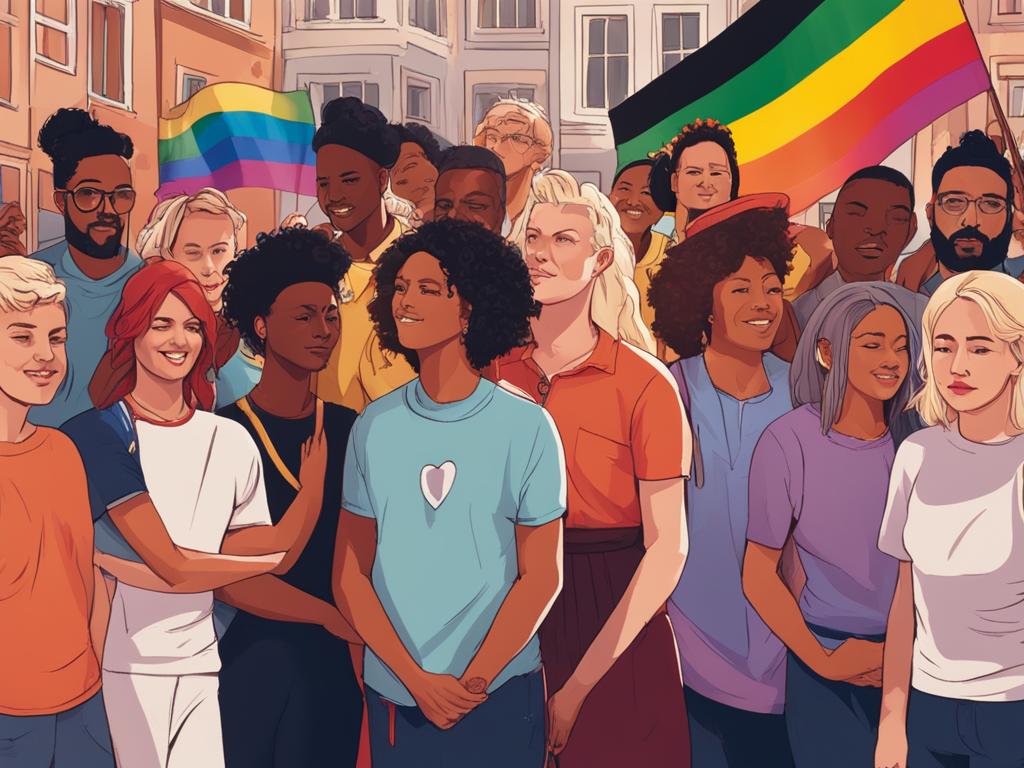As the fight for equality and acceptance continues, understanding the state of LGBT rights in Europe is crucial. The LGBTQ+ community in Europe faces a range of challenges, from discrimination and harassment to the fight for legal protections and social acceptance. In this article, we will explore the important things you need to know about LGBT rights in Europe and the ongoing struggles faced by the community. Let’s dive in!
Key Takeaways:
- LGBTI people in Europe can face discrimination in various aspects of life, including employment, social security benefits, education, and healthcare.
- The EU has implemented legislation against discrimination based on sexual orientation to protect LGBTI individuals.
- Challenges persist, with hate speech, violence, and varying levels of social acceptance across EU countries.
- Civil society organizations and the European Commission play a crucial role in supporting and advocating for LGBTI rights.
- Public opinion on LGBTI rights in Europe has become more positive, but attitudes still vary among countries.
Legal Protections for LGBTI Individuals in Europe
Discrimination based on sexual orientation has been prohibited in the EU since 1999, ensuring LGBT individuals are granted legal rights and protection against discrimination in the workplace.
The European Union recognizes the importance of combatting homophobia and discrimination across various areas, including education, healthcare, and hate crime prevention.
The Workplace: Equal Rights and Protection
All EU member states are required to provide legal protection against discrimination based on sexual orientation in the workplace. This ensures that LGBT individuals have equal rights to employment, promotion, and fair treatment in their professional endeavors.
Education, Healthcare, and Hate Crime
The EU actively works to combat discrimination against the LGBTQ+ community in areas such as education, healthcare, and hate crime prevention. Policies and initiatives are in place to raise awareness, encourage inclusivity, and protect the rights of LGBT individuals in these crucial aspects of life.
However, despite legal protections and efforts to combat discrimination, the recognition of same-sex relationships and adoption rights for same-sex couples varies among EU member states.
Challenges and Ongoing Struggles for LGBTI Community in Europe
Despite legal protections, the LGBTI community in Europe continues to face numerous challenges and ongoing struggles. From persistent hate speech and violence to varying levels of social acceptance and attitudes towards LGBTI rights, the fight for equality remains an uphill battle across EU countries.
Hate speech and acts of violence against LGBTI individuals are still prevalent in Europe. This discrimination takes a toll on the mental, emotional, and physical well-being of those targeted, contributing to a climate of fear and prejudice. Such acts hinder the progress towards a more inclusive and accepting society.
Moreover, attitudes towards LGBTI rights and social acceptance vary significantly across EU countries. While some countries have made significant strides in promoting equality and embracing diversity, others lag behind, perpetuating systemic discrimination and exclusion.

“LGBTQ+ individuals in Europe face significant challenges in achieving equality and acceptance. It is crucial that we continue to fight for the rights and well-being of all members of the community.” – Elena, LGBTQ+ activist
Furthermore, certain countries have enacted laws that restrict the rights of LGBTI individuals, further exacerbating the struggle for equality. For example, Hungary’s ban on adoption for same-sex couples and Russia’s prohibition of “homosexual propaganda” impede progress and reinforce discriminatory practices.
Despite these challenges, there is hope. Advocacy and activism play a vital role in driving social change and supporting the rights of the LGBTI community. Through grassroots movements, demonstrations, and awareness campaigns, activists work tirelessly to challenge discrimination, change hearts and minds, and pave the way towards a more inclusive future.
LGBT activism in Europe:
- Organizing pride parades and demonstrations to raise awareness and demand equal rights
- Collaborating with NGOs and advocacy groups to fight discrimination and support the community
- Providing resources, safe spaces, and support networks for LGBTI individuals
- Advocating for LGBTI-inclusive policies and legislation at local, national, and EU levels
By highlighting the challenges and ongoing struggles faced by the LGBTI community in Europe, we can foster greater empathy and understanding, mobilize support, and work towards a more equitable and accepting society.
Support and Activism for LGBTI Rights in Europe
Civil society organizations and advocacy groups play a crucial role in promoting and advocating for LGBTI rights in Europe. These organizations work tirelessly to raise awareness about the challenges and discrimination faced by LGBTI individuals, striving for greater acceptance and equality. One such notable organization is ILGA-Europe, the European branch of the International Lesbian, Gay, Bisexual, Trans, and Intersex Association.
ILGA-Europe works towards advancing LGBTI rights and legal protections across Europe. With over 600 member organizations from 54 countries, it actively campaigns for inclusive policies and legislative reforms that promote equality and challenge discrimination. Through its research, advocacy, and capacity-building initiatives, ILGA-Europe strives to empower local communities and ensure the voices of LGBTI individuals are heard.
“We believe that protecting and promoting the rights of LGBTI people is not just the right thing to do, but also essential for building vibrant, inclusive, and democratic societies.” – ILGA-Europe
In addition to civil society organizations, the European Union provides crucial financial support to promote and strengthen LGBTI rights at both the European and national levels. The European Commission funds numerous initiatives and projects aimed at combating discrimination, increasing awareness, and fostering social acceptance. These initiatives facilitate collaboration between different stakeholders, including non-governmental organizations, public authorities, and local communities, to drive positive change.
Furthermore, the European Parliament has been actively involved in supporting LGBTI rights. Through resolutions and policies, it advocates for equality, non-discrimination, and the protection of the rights of LGBTI individuals. The Parliament’s commitment to promoting acceptance and non-discrimination contributes to the advancement of LGBTI rights in Europe.
Key Organizations and Initiatives Supporting LGBTI Rights in Europe
| Organization | Focus Areas |
|---|---|
| ILGA-Europe | Advocacy, research, capacity-building |
| European Union | Financial support, awareness campaigns |
| European Parliament | Resolutions, policies, advocacy |
These organizations and initiatives not only provide support and resources for the LGBTI community in Europe but also contribute to shaping public opinion and fostering a culture of acceptance. Through their collective efforts, they help create an inclusive and equitable society where everyone, regardless of sexual orientation or gender identity, can live with dignity and without fear of discrimination.

Public Opinion and Attitudes towards LGBTI Rights in Europe
Public opinion on LGBTI rights in Europe has been evolving positively in recent years. A majority of Europeans now recognize the importance of granting equal rights to LGBTI individuals, affirming that they should enjoy the same rights as their heterosexual counterparts.
However, it’s important to note that attitudes towards LGBTI rights vary across different EU countries. Some countries have shown higher levels of acceptance and support for the LGBTI community, while others still have progress to make in fostering a more inclusive society.
These varying attitudes have a direct impact on the level of discrimination and social acceptance experienced by LGBTI individuals in different countries. The more accepting a society is of diverse sexual orientations and gender identities, the lower the levels of discrimination and the greater the social acceptance.
Public Opinion in European Countries
To provide a better understanding of public attitudes towards LGBTI rights in Europe, let’s take a closer look at the situation in two EU member states: the Netherlands and Poland.
| Country | Public Attitudes |
|---|---|
| Netherlands | Known for its progressive stance on LGBTI rights, the Netherlands has consistently shown high levels of acceptance and support. Same-sex marriage has been legal since 2001, and the country consistently ranks among the most LGBTQ+ friendly in Europe. |
| Poland | Poland, on the other hand, has a more conservative social climate regarding LGBTI rights. Recent years have seen a rise in anti-LGBTI sentiments, with some regions declaring themselves “LGBT-free zones.” This environment has created significant challenges for the LGBTI community in Poland. |
These examples illustrate the contrasting attitudes towards LGBTI rights within Europe and the impact they have on the experiences of LGBTI individuals in different countries.
As societies continue to progress and evolve, fostering greater acceptance and support for LGBTI individuals becomes paramount in achieving true equality and inclusion for all.
Conclusion
While significant progress has been made in advancing LGBTI rights in Europe, it is important to acknowledge that challenges and inequalities still persist. Discrimination against the LGBTI community continues to be a pressing issue, with almost half of surveyed individuals reporting experiences of discrimination or harassment.
The European Union has taken important steps to combat discrimination and support the rights of LGBTI individuals. Legal protections against discrimination based on sexual orientation have been established across all EU member states, and legislation has been enacted to address hate crime and homophobia in various areas of life. However, the recognition of same-sex relationships and adoption rights for same-sex couples continues to vary among countries.
The fight for greater equality and acceptance for the LGBTI community in Europe requires collective efforts from civil society organizations, advocacy groups, and government bodies. Initiatives and projects aimed at raising awareness about the challenges faced by LGBTI individuals play a crucial role in driving positive change. Additionally, the European Parliament’s support through resolutions and policies underscores the commitment to safeguarding LGBTI rights.
In conclusion, while there is still work to be done, the advancement of LGBTI rights in Europe demonstrates a collective effort to promote equality and combat discrimination. It is vital to continue advocating for positive change, raising awareness, and pushing for greater acceptance to ensure that the rights and well-being of the LGBTI community are fully protected and supported.
FAQ
What legal protections are in place for LGBTI individuals in Europe?
Discrimination based on sexual orientation has been prohibited in the EU since 1999, and all EU countries are required to provide legal protection against discrimination in the workplace. The EU also works to combat homophobia and discrimination in various areas, including education, healthcare, and hate crime. However, the recognition of same-sex relationships and adoption rights for same-sex couples vary among EU member states.
What challenges does the LGBTI community in Europe face?
The LGBTI community in Europe still faces challenges and ongoing struggles. Hate speech and violence against LGBTI individuals persist, and social acceptance and attitudes towards LGBTI rights vary across EU countries. Some countries have enacted laws that restrict the rights of LGBTI individuals, such as Hungary’s ban on adoption for same-sex couples and the prohibition of “homosexual propaganda” in Russia.
What support and activism exists for LGBTI rights in Europe?
Civil society organizations and advocacy groups play a crucial role in promoting and advocating for LGBTI rights in Europe. The European Commission financially supports these organizations at the European and national levels. Various initiatives and projects aim to raise awareness about the challenges and discrimination faced by LGBTI people. Additionally, the European Parliament has taken a stance in support of LGBTI rights through resolutions and policies.
What is the public opinion and attitudes towards LGBTI rights in Europe?
Public opinion on LGBTI rights in Europe has become more positive, with a majority of Europeans agreeing that LGBTI people should have the same rights as heterosexual people. However, attitudes vary among EU countries, with some countries showing higher levels of acceptance and support compared to others. Social attitudes also influence the level of discrimination and social acceptance experienced by LGBTI individuals in different countries.
What is being done to promote LGBTI rights in Europe?
While progress has been made in advancing LGBTI rights in Europe, challenges and inequalities still exist. The EU continues to work towards combating discrimination and supporting the rights of LGBTI individuals. Efforts from civil society organizations, advocacy groups, and government bodies are crucial for achieving greater equality and acceptance for the LGBTI community across Europe. It is important to continue promoting positive change and raising awareness about the rights and challenges faced by LGBTI individuals.
